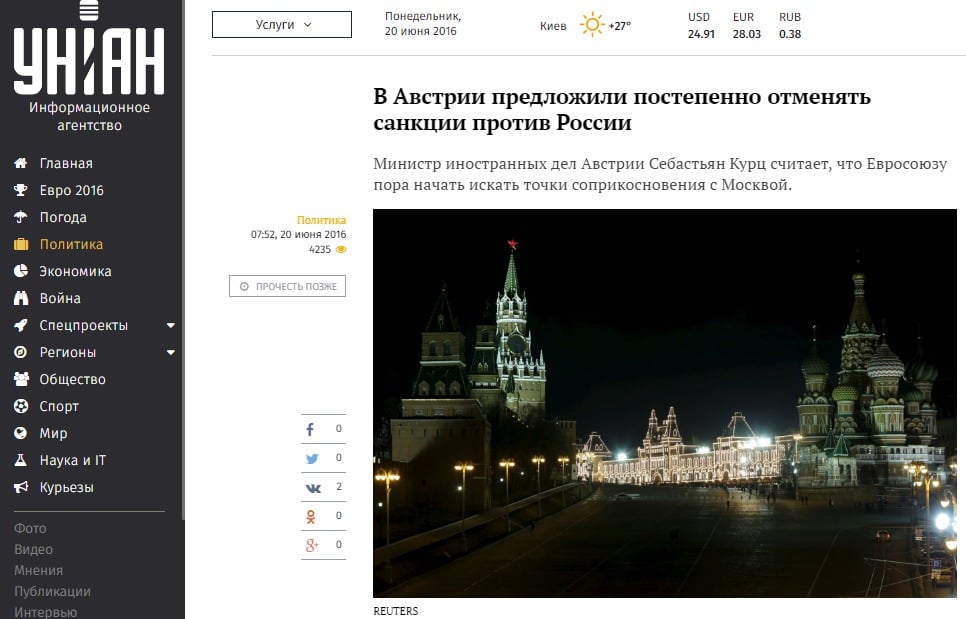Ukraine Day 1052: LIVE UPDATES BELOW.
Yesterday’s live coverage of the Ukraine conflict can be found here.
- READ OUR SPECIAL REPORT:
An Invasion By Any Other Name: The Kremlin’s Dirty War in Ukraine
000000
Two Ukrainian soldiers were wounded in the Donbass as Kiev reports 39 attacks by Russia-backed forces yesterday.
According to this morning’s report from the Ukrainian military, Russia-backed forces shelled the seaside village of Shirokino, near Mariupol, and Luganskoye, between occupied Debaltsevo and Bakhmut (formerly Artyomovsk) with mortars.
Colonel Oleksandr Motuzyanyk, spokesman for the Ukrainian Ministry of Defense, gave a press briefing at noon today:
Meanwhile the Russia-backed separatists in Donetsk have accused Ukrainian forces of firing more than 1,000 grenades and over 100 mortar rounds over the last day.
Eduard Basurin, deputy commander of the armed forces of the so-called Donetsk People’s Republic (DNR), claimed today that over the previous 24 hours, Ukrainian troops had fired 1,010 grenades from various types of launchers, and 125, 82, or 120 mm mortar shells.
The DNR claims that Ukrainian forces shelled the outskirts of Donetsk and Gorlovka, as well as the villages of Kominternovo, Leninskoye and Sakhanka, east of Mariupol.
— Pierre Vaux
The new chairman of the OSCE, Sebastian Kurz, has said that local elections in the Donbass can only be held after a complete ceasefire.
Kurz, the foreign minister of Austria, which took over the OSCE’s rotating chair this year, arrived in Ukraine on Monday and has visited front-line areas near Mariupol, including Ukrainian positions near the village of Pishchevik, just a few kilometers from Russian-occupied territory.
LIGA.net reports that, during a press conference in Mariupol today with the Ukrainian foreign minister, Pavlo Klimkin, Kurz said that a complete ceasefire should be the main condition for any local elections in the occupied territories of the Donbass.
“This must be the basis for holding free and fair elections.”
According to Interfax-Ukraine, Kurz said that the OSCE Special Monitoring Mission to Ukraine (SMM) will expand its area of operations to cover the entire territory of the Donbass in order to properly monitor the ceasefire.
At a briefing in Mariupol on Wednesday morning, he also said one needs to be realistic about the mission’s powers. Answering a question of Ukrainian journalists about the possibility of the OSCE police mission deployment in Ukraine, he stressed the OSCE has 57 member states and all the decisions are taken by consensus.
He stressed the OSCE will do everything so that the mission should operate as efficiently as possible, hold surveillance over the entire territory of Donbas so that the mission’s effort should help achieve a complete ceasefire.
However, the efforts of the OSCE mission alone are not enough, the chairman of the organization said. The efforts of decision makers in Moscow, Kyiv and other countries are needed, Kurz said.
The minister also noted the importance of restoring the destroyed infrastructure in Donbas, but stressed the priority of ensuring the ceasefire on both sides.
Klimkin added that Russia must provide the SMM access to the entire stretch of the border between Russia and Ukraine that is beyond government control. At the moment, Russia only allows the SMM access to two crossing points, allowing troops and hardware to cross the border elsewhere without monitoring.
LIGA reports that, with regards to the Minsk agreements, signed in September, 2014 and February, 2015, which outline a peace process including the withdrawal of heavy weaponry, the implementation of a ceasefire, return of border control to Ukraine and the holding of local elections in the Donbass, Kurz said:
“We must continue the negotiations. Minsk is the only basis on which they are being conducted,” said Kurz.
According to him, there is concern with regards to the effectiveness of the Minsk agreements.
“I am not satisfied with the current status-quo, but in the absence of another base document we must fulfill Minsk.”
There have been media reports, often from, but not restricted to Russian state media on several occasions in the last year, claiming that Kurz favours the weakening of sanctions against Russia.
However these reports seem to be somewhat skewed, as this StopFake article from June explains:

Misleading headlines: Austria calls for gradual reduction of Russia sanctions
In their coverage of the news about the EU's relations with the Kremlin, Ukrainian and Russian media reported that Austrian Foreign Minister Sebastian Kurz was calling for a gradual reduction of sanctions against the Russian federation. The Ukrainian news agency UNIAN opened their story with the headline "Austria proposes gradually cancelling Russia sanctions".
Once again, an examination of the original source – an interview with Der Spiegel, suggests a similar spin has been applied.
In the interview, Kurz says that “there is nothing to prevent sanctions being gradually slackened” in the event of “significant progress” in the Minsk peace process.
This does indeed represent a shift from the official line of the EU on sanctions, which would allow sanctions to be lifted only after the full implementation of Minsk.
However it is misleading to say that Kurz’s avowed aim is to ease sanctions on Russia, but to utilise the offer of lifting certain sanctions as an enticement to encourage cooperation from the Kremlin in Ukraine.
A broader issue with both Kurz’s and the current EU positions on sanctions relief with relation to Minsk is that sanctions were originally imposed not in response to Russia’s actions in the Donbass, but the occupation of Crimea – something that is not covered at all by Minsk.
— Pierre Vaux
